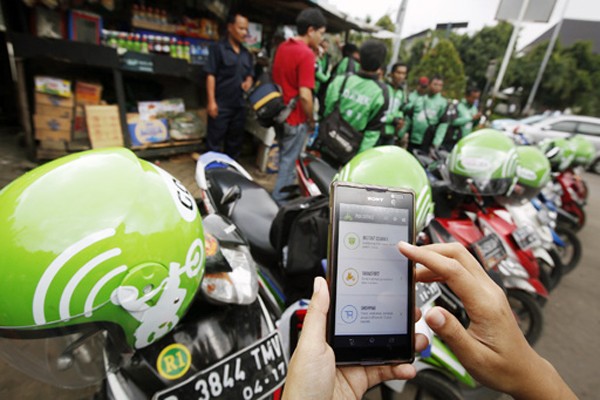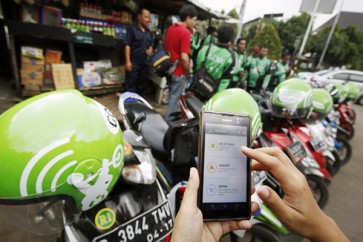Disruption in mental revolution is natural
With 27 percent market share, Go-Pay is recorded to be the fourth-largest e-money player after Mandiri, BCA-Flazz card and Telkomsel T-Cash.
Change Size
 A Jakarta resident uses his smartphone to access the Go-Jek application. With 27 percent market share, Go-Pay is recorded to be the fourth-largest e-money player after Mandiri, BCA-Flazz card and Telkomsel T-Cash. (JP/Jerry Adiguna)
A Jakarta resident uses his smartphone to access the Go-Jek application. With 27 percent market share, Go-Pay is recorded to be the fourth-largest e-money player after Mandiri, BCA-Flazz card and Telkomsel T-Cash. (JP/Jerry Adiguna)
T
he birth and rise of the app-based services provided by Go-Jek has marked the era of disruption in the Indonesian economy. The company is perceived to be valued far above that of national flag carrier Garuda Indonesia and Blue Bird taxi firm, which have huge tangible assets.
The presence of Go-Jek is not only disrupting the competitive landscape of the transportation business in Indonesia but it is also perceived to position itself as one of the major players of e-money in the country. With 27 percent market share, Go-Pay is recorded to be the fourth-largest e-money player after Mandiri, BCA-Flazz card and Telkomsel T-Cash.
Disruption signifies the magnitude of enormous force beneath the surface of some of the major shift that is happening in many aspects in our life.
The suspected slowing pace of Glodok and Ambassador Mall trade activities in Jakarta recently are the stark reality of how the shifting power of disruption is taking place in the Indonesian retail industry. Digital platform business and commerce is believed to have shifted a significant portion of the traditional market into a virtual and seamless marketplace.
In banking and the financial services industry, the presence of robo-advice and crypto-currencies has changed the nature of the relationship between customers and financial service providers. Banking and financial services are now becoming more and more decentralized and democratized. Artificial intelligence (AI) through digital and the Internet of everything (IoT) platform provide unprecedented real-time, seamless and externalized financial transactions.
A former executive of Citibank, Vikram Pandit predicts 30 percent of the banking global workforce will likely disappear within the next five years due to AI and robot-advice.
The World Economic Forum (WEF) predicts that by 2024 and 2026, translations and high school essays will be fully completed by AI. By 2026, it is projected that self-driving trucks will be roaming the street.
















